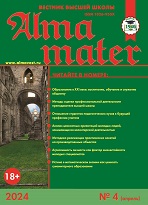https://doi.org/10.20339/AM.12-17.050
I.G. Korneva is lecturer e-mail: Favouriteworkk@mail.ru ; G.F. Gali is Cand.Sci. (Pedagogy), doc. e-mail: gulnaragali@mail.ru; and E.A. Andreeva is Cand.Sci. Philology), doc. e-mail: elenaandreeva7788@mail.ru at Kazan (Volga region) State University
Analyzed is the problem of specifics of education of gifted students. The article is aimed on identifying of professionally significant and personal qualities of pedagogues, needed for work with gifted students. The leading approach to the study of this problem is the method of historical and logical analysis of regulatory documents of foreign governments and research papers of leading scientists, dealing with issues of education of gifted personals. The principal result of the study is in identifying of modern trends of special training of pedagogues for work with gifted students abroad. Special attention is paid to professional competences and personal qualities of pedagogues. Materials of the article are oriented on professors, teachers, students, as well as on wide range of readers, interesting in problems of gifted students’ education.
Key words: gifted students’ education, professional competence, personal qualities, training of teacher.
References
- Ainutdinova, I.N., Ainutdinova, V.A. Pedagogical conditions for realization of technology of integration of professional and foreign language training of competitiveness specialist. In: Foreign languages in the modern world. Kazan, 2016, pp. 9–15.
2., 2016.
- Gali, G.F. Pedagogical requirements for professional and personal qualities of pedagogues as to work with gifted students. In: New science: theoretical and practical view. Nizhny Novgorod, 2016, pp. 16–18.
- Allodi, M.W. & Rydelius, P.A. (2008). The needs of gifted children: a pilot-study of Swedish Teachers’ knowledge and attitudes. Proceeding of the 11th ECHA Conference. In: Giftedness in childhood to successful intelligence in Adulthood. Prague.
- Kagan, J. Personality and the learning process. Creativity and learning. Boston: Houghton Mifflin, 2011.
- NACE Challenge Award. Provision for Able, Gifted and Talented Pupils. Oxford: NACE Publication, 2006.
- National Association for Gifted ChildrenJacob Javits Gifted and Talented Students Education Act. URL: http:// www. nagc.org (2007).
- Nelson, J. The role of the teachers of the gifted and creative children. New York: Irvington Publishers, 2011.
- Ornstein, A.C. Successful Teachers: What We Know About Them. The High School Journal, 2005, 78/3, pp. 164-171.
- Seeley, K. Competencies for teachers of gifted and talented children. Journal for the Education of the Gifted, 2003, 3/ 1, pp. 7–13.
- Sook, L. Empowering teachers for New Roles in a New Education System. Education Technology, 2014, 34/ 1, pp. 61–72.











.png)






